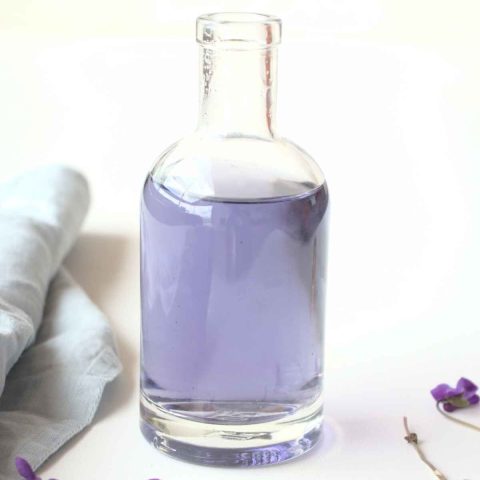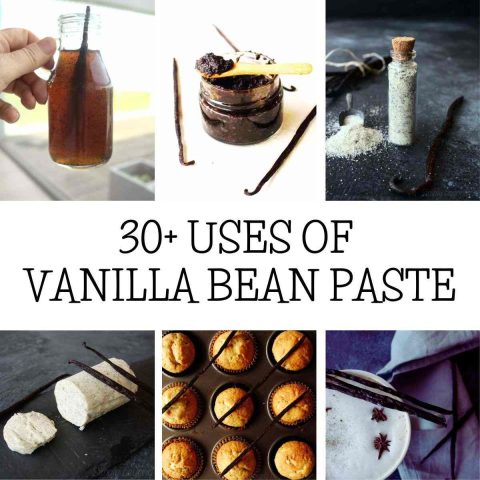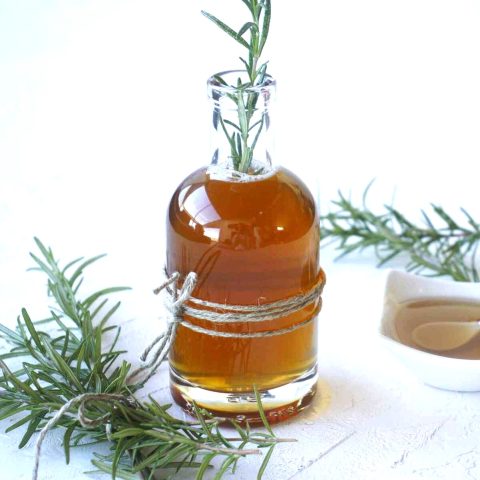This homemade rosemary beard oil moisturizes and softens coarse hair making your beard look healthy and fuller. It also prevents itchiness and dandruff (or “beardruff”) and may promote beard growth.
You don’t need to have a bearded man in your life to make this rosemary beard oil. Movember, also called “no shave November” makes many unbearded men (including mine) participate. Thus this all-natural beard oil recipe comes in handy.

Why to use Beard Oil?
Beard hair tends to be rough in texture and sometimes itchy. Beard oil not only moisturizes and softens beard hair but also softens the skin beneath. It makes your beard look softer and fuller and may also promote beard growth and reduce the occurrence of beard dandruff.
Rosemary oil for beard
This natural beard oil is very simple to make with ingredients you may have at your disposal. The recipe contains a combination of oils and herbs that possesses medicinal benefits for hairs and beard hairs.
Rosemary for beard
The easy-to-grow culinary herb rosemary is by far not used just for cooking. With its typical needle-like leaves and pungent scent, rosemary makes a great addition to shampoo, hair oils, soaps, or even perfumes.
And it is not a coincidence that rosemary often appears in hair and beard products.
Rosemary is known for its ability to increase blood flow thus promoting hair and beard growth, leaving your beard thick and healthy.
Moreover, Rosemary offers anti-inflammatory and antibacterial benefits that help to nourish beard follicles and soothe them. It also prevents dandruff or beardruff.
To get the most medicinal benefits of rosemary we need to infuse it in a carrier oil. Searching among carrier oils for this purpose, jojoba oil was the best choice. Extracted from the seeds of the jojoba plant, jojoba oil acts as a natural conditioner.
It contains antibacterial and antifungal properties that help to prevent beard dandruff and itchiness. It is also packed with vitamins and minerals that nourish the beard as well as copper and zinc. You can also use other carrier oils such as argan oil, sunflower oil or hemp oil instead.
i used this rosemary oil to make this DIY cuticle oil.
Apricot kernel oil
Apricot oil penetrates deeply into your facial hair leaving them soft and shiny.. It retains moisture keeping your beard healthy and well-nourished. Apricot oil contributes to beard hair growth and helps to manage and detangle unruly beards.
How to make beard oil at home?
First step – prepare rosemary
If you grow your own rosemary I suggest you dry it first. Using fresh rosemary may cause the beard oil to spoil faster than if you used dried rosemary. The water content in the fresh herbs leaches into the oil and causes spoilage.
You can either tie bunches of fresh rosemary with string and hang it or place rosemary sprigs on parchment paper and leave it in a well-ventilated area to air-dry. It takes a couple of days. Alternatively use a dehydrator or oven on the lowest temperature if you are in a hurry.

Second step – Infusing rosemary in a jojoba oil
There are two main infusion methods
The easiest method and my favorite is a cold maceration. Place dried rosemary in a sterilized glass jar and fill it with jojoba oil. Leave it for 4 weeks to macerate. Check occasionally, make sure that rosemary is covered completely with the oil. After four weeks filter the oil with cheesecloth to get rid of all the herbal material and get only pure rosemary oil.

In case you are running out of time like me and want to have your rosemary oil ready faster, go for the double boiler method. Place your glass jar with dried rosemary and jojoba oil in a DIY double boiler and bring to a slow simmer. Heat the mixture to a temperature of 50 C (122 F) and keep the heat nice and low for a longer simmer (5-6 hours) to help release medicinal properties. For a stronger scent and more powerful oil strain the oil after 5 hours and fill the glass jar with the second batch of dried rosemary. Repeat the process as many times till the oil takes on the desired color and the scent.

Third step
Add apricot kernel oil to the pure rosemary-infused oil and mix it well

Fourth step
Add essential oils. This is an optional step. Essential oils can add lovely masculine woodsy smell such as texas cedarwood, and orange essential oil. There are, however Essential oils for beard growth and thickness such as peppermint oil, rosemary oil, tea tree oil of lavender oil.

Rosemary Oil Beard benefits
- If you use this rosemary beard oil every day, it prevents the food from getting stuck in it. This will save you from some embarrassing situations.
- It gives your beard a much better smell than when you have a non-oiled beard.
- Taking a few extra moments every day to groom your beard ensures that your beard grows healthy and shiny.
- It will prevent occurrence of beard dandruff
- makes your beard look softer and fuller
- may also promote the beard growth

Take a nice warm shower and apply when your hair is still damp. Apply a few drops and massage underneath the beard. Use fingers to comb through beard hair so all hairs are conditioned. Alternatively use this beard comb to smooth the hair and encourage it to grow and lay in one direction. For thicker, longer beards apply a few more drops and repeat.
Use this oil as a base to make a beard balm or beard butter
The best use is to apply twice a day – morning and evening before bedtime so the beard oil can work overnight. Some people also use it
Use a dropper to put the rosemary oil into your palms. Depending on the beard length you can use it as follows:
Short Beard: 1-2 drops
Medium Beard: 3-4 drops
Long Beards: 5+ drops
Rosemary beard oil

This homemade rosemary beard oil moisturizes and softens coarse hair making your beard look healthy and fuller. It also prevents itchiness and dandruff and may promote beard growth.
Materials
Tools
Instructions
- Use a 100 ml sterilized jar (1 /2 cup) that you fill with dried rosemary leaves.
- Pour in fine jojoba oil so the leaves are completely submerged in oil
- Place your glass jar with dried rosemary and jojoba oil in a double boiler and bring to a slow simmer.
- Heat the mixture to a temperature of 50 C (122 F) and keep the heat nice and low for a longer simmer (5-6 hours) to help release medicinal properties.
- Then filter through a cheesecloth, squeeze out the rest,
- add apricot oil to the mixture
- add tea tree essential oil and orange essential oil
- store the oil in dark bottles away from direct sunlight.
Notes
You can also select the cold maceration method where you place the jar filled with dried rosemary leaves and carrier oil in the sun or in a warm place for 2 weeks. Strain it afterward to get rid of all the herbal material and get only pure rosemary oil.
Recommended Products
As an Amazon Associate and member of other affiliate programs, I earn from qualifying purchases.
-
 Cobalt Glass Bottles with Dropper
Cobalt Glass Bottles with Dropper -
 Norpro 249 Stainless Steel Double Boiler 1.5-Quart
Norpro 249 Stainless Steel Double Boiler 1.5-Quart -
 Wide Mouth Pint Mason Jars with Lids & Bands | 16-oz | 2-Pack
Wide Mouth Pint Mason Jars with Lids & Bands | 16-oz | 2-Pack -
 Fine Mesh Stainless Steel Strainers
Fine Mesh Stainless Steel Strainers -
 Cheesecloth, Grade 90, 54 Sq Feet, 100% Unbleached Cotton Fabric, Ultra Fine Reusable Cheesecloth for Cooking, Straining (Grade 90-6Yards)
Cheesecloth, Grade 90, 54 Sq Feet, 100% Unbleached Cotton Fabric, Ultra Fine Reusable Cheesecloth for Cooking, Straining (Grade 90-6Yards)

Collection of infusion oils you might want to try
Collection of infusion oils you might want to try
DIY rose oil for skin and hair
This highly scented and effective rose oil is a must have item in your household. Our DIY rose infused oil goes a little bit further with ultra rich grape seed oil and petals from Rose Damascena.
How to make nettle oil
This mineral-rich nettle oil is a powerful remedy with a wide spectrum of uses from easing stiff joints to scalp and hair treatment. Made of nettle leaves this effective oil might help with skin irritations or baldness.
Scented Lavender infused oil
Infusion Lavender oil soothes minor skin irritations and eczema. It is also suitable for mild burns, yeast infections or for insect bites.
DIY Dandelion oil to heal your cracked hands
Dandelion oil is used in salves, lotions, and lip balms to soothe dry and cracked skin. Thanks to its capability to speed up the healing process of scars and calm down skin irritations dandelion oil is also efficient in acne treatment.
Uses and benefits of Calendula oil
Calendula (Calendula Officinalis, a.k.a. “Pot Marigold”) has its well-defined place in the herbal world. It’s not only the bright color and sweet smell that distinguish this plant from the others. But mainly it’s healing power and capability to cleanse wound made it internal as well as external number one choice of herbal healer.
How to make & use red clover oil
purple blossoms of the red clover make an outstanding nourishing oil that, by increasing collagen production, improves the elasticity of your skin and reduces wrinkles. Its anti-inflammatory properties can also help with eczema or psoriasis.
Powerful Elderflower infusion oil to soften your skin
Elderflower infusion oil has a powerful soothing effect on the skin, improves skin complexion and is especially useful for older skin. However, it is also very effective in treating acne or sunburns. It's anti-inflammatory and anti-wrinkle properties made the elderflower infusion oil very popular in the cosmetic industry.
How to make Rosehip oil to heal your skin
Packed with antioxidants and fatty acids, rosehip oil is a natural versatile moisturizer that will heal your hair, nails and skin from bruises, acne and wrinkles.
How to make Violet oil and its uses
Extracted from leaves and flowers of wild violets this violet oil possesses many benefits for skin and hair and might be also able to help with insomnia or rheumatic pain.
How to make chamomile oil
This soothing chamomile oil extracted from chamomile flowers deeply nourishes and restores the skin. Its healing properties can be used in wound healing, diaper rash, or eczema.
Cucumber oil recipe for skin and hair
Deeply moisturizing and nourishing cucumber oil soothes and protects dry skin and hair adding softness and hydration.
How to make lemon balm oil + 10 ways to use it
This soothing lemon balm oil moisturizes and promotes skin healing. Lemon balm oil’s healing properties may help with cold sores.




























Is it possible to use rosemary essential oil instead of infusing the apricot oil with rosemary? I didn’t preserve any rosemary from my garden this year so I don’t have any and don’t wa t to have to buy any. About how much should I use?
It is also an alternative. Use jojoba oil as the carrier oil with 15 drops of rosemary essential oil.